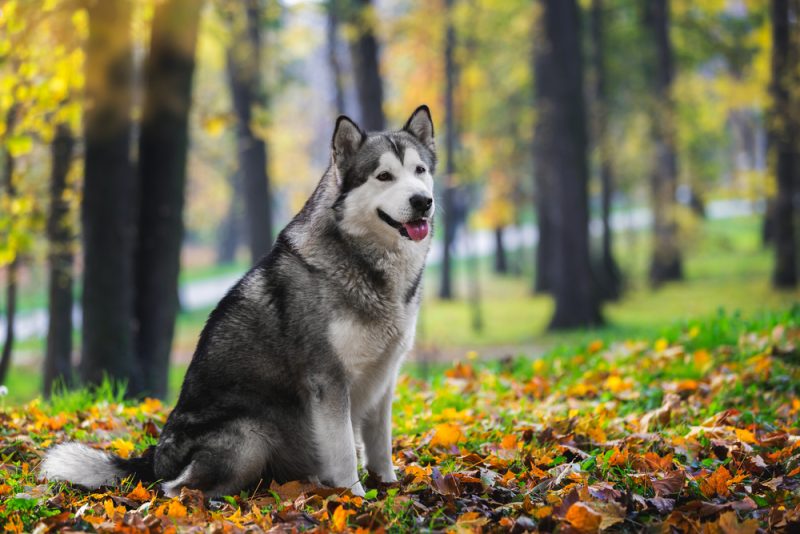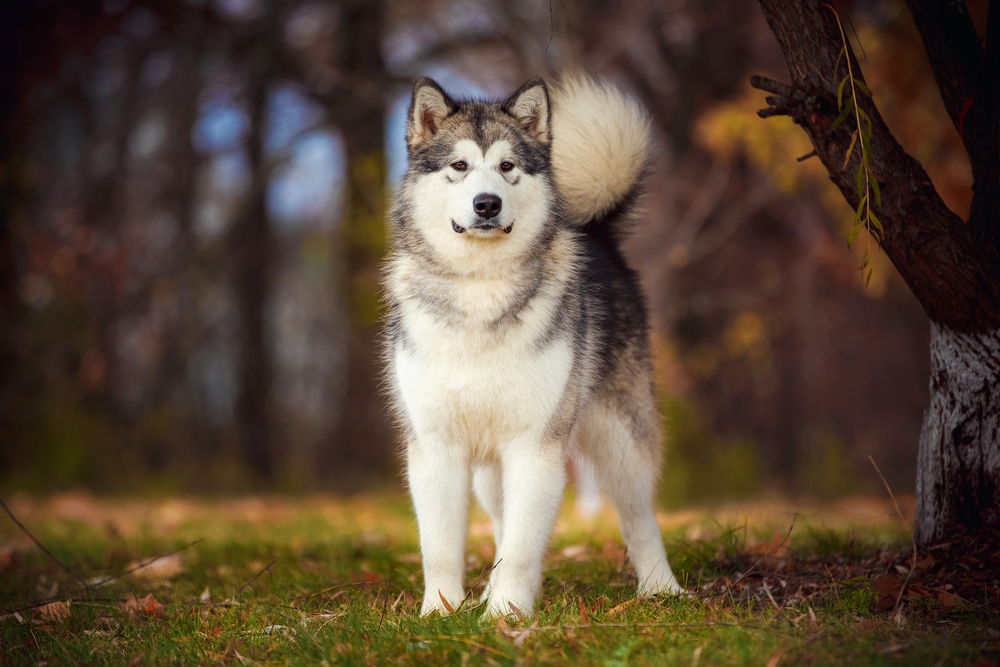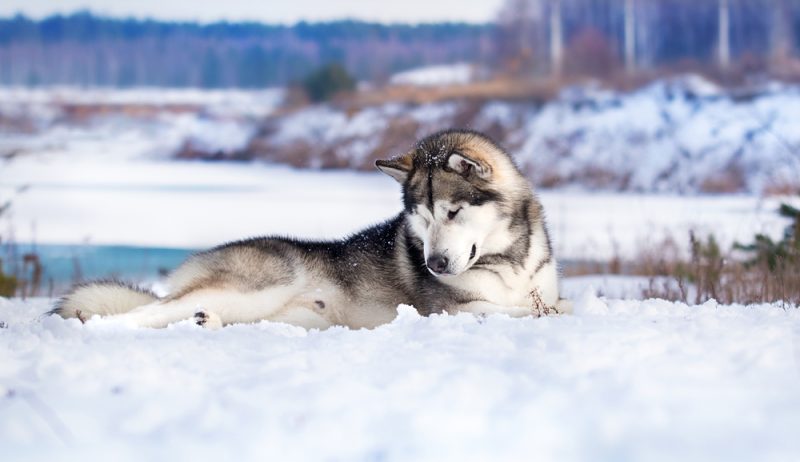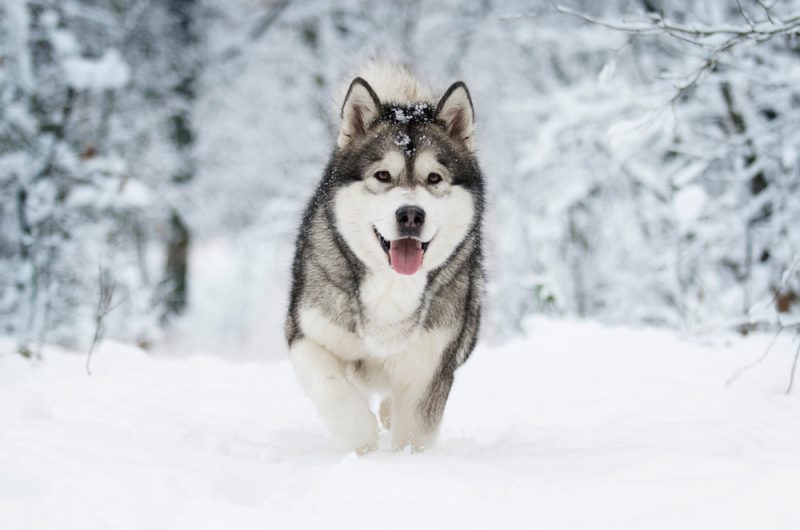Original Article: https://www.dogster.com/dog-breeds/alaskan-malamute-facts
Alaskan Malamutes are some of the most gorgeous canines around, as well as some of the hardest working. This spitz breed is made for heavy-duty work and has incredible endurance. Despite their use as work dogs, they’re more often found as beloved family pets; with their friendly, loyal, and playful temperaments, these dogs make excellent companions!
You might think you know everything about the Alaskan Malamute, but we have 13 facts below that might show you don’t. If you want to learn more about this well-loved dog breed, keep reading!


The 13 Alaskan Malamute Facts
1. The Malamute name comes from an Inuit tribe.
The original breeders of the Alaskan Malamute were the Mahlemut. This nomadic Inuit tribe lived in northwestern Alaska on the shores of the Kotzebue Sound. They bred Alaskan Malamutes to work as pack animals and sled dogs. You can find mentions of the breed in the Mahlemut’s early literature, as these dogs were vital to their way of life and survival.

2. Alaskan Malamutes are an ancient breed.
This dog breed is an ancient one that dates back around 5,000 years! In fact, the Alaskan Malamute is considered one of the world’s oldest Arctic sled dog breeds. Though their name comes from an Alaskan Inuit tribe, these dogs originated in Siberia and were introduced to North America millennia ago after crossing the Bering Strait.1
3. This breed is credited with helping Alaska become open to settlement.
It may seem odd that a dog breed is credited with helping open a place for settlement, but this is the case with the Alaskan Malamute. Why are they credited with aiding in the development and growth of Alaska? Because these dogs were used for work such as transporting supplies and carrying mail, they helped expand the reach of people living in Alaska to areas outside it. This helped encourage others to move to the area.
4. The Alaskan Malamute nearly went extinct.
Did you know this breed almost went extinct? During the 1896 Klondike Gold Rush, sled dogs, including the Alaskan Malamute, were in high demand. However, once people had Alaskan Malamutes, they began crossbreeding them with canines in their local areas to help keep up with the high demand for sled dogs. This means the pure bloodline of the Alaskan Malamute was almost lost. Thankfully, the bloodline was saved as the Mahlemut tribe still has some of these dogs and was able to breed more of them.

5. Alaskan Malamutes took part in the 1925 Serum Run.
You might’ve heard of the 1925 Serum Run, as it’s an important piece of history.2 The Serum Run occurred when a deadly diphtheria outbreak hit Nome, Alaska. They desperately needed the antitoxin to the disease but getting it there would be challenging. However, an Alaskan Malamute named Balto and a Siberian Husky named Togo led a sled dog team through incredibly harrowing conditions to safely deliver the antitoxin to the town, saving the people of the town in the process. The feat was so heroic a statue of Balto was erected in Central Park!3
6. This breed was used in both World Wars.
Alaskan Malamutes have a long history of helping out humans. Not only have they been used to carry supplies and heroically transport antitoxins, but they were also utilized during World War I and World War II. In WWI, around 450 of these dogs were sent to France to help deliver supplies to isolated mountain outposts where French army troops were stationed.4 During WWII, this breed was used for a variety of tasks, including carrying weapons and acting as search-and-rescue dogs. Alaskan Malamutes have accomplished a number of heroic deeds!
7. The Alaskan Malamute became the official state dog of Alaska in 2010.
As you can see, the Alaskan Malamute has been vital to the history of Alaska, so it makes sense that they eventually became the official state dog. On April 18, 2010, the breed was officially voted in as the state dog due to their significant role in Alaskan history.5 However, this was all possible thanks to major efforts made by teachers and students from a school located in Anchorage!

8. Purebreds of this breed come from one of three bloodlines.
All of today’s purebred Alaskan Malamutes come from one of three distinct bloodlines: the M’loot, Hinman, and Kotzebue. The Kotzebue is the name of the line on which the first breed standard was based. This line’s breed standard was recognized by the American Kennel Club (AKC) in 1935.6 Around this time, two more Alaskan Malamute bloodlines were created. Dick Hinman created the Hinman line, while Paul Voelker created the M’Loot line.
9. Some Alaskan Malamutes carry a gene responsible for day blindness.
What is day blindness? Day blindness, also known as hemeralopia, is a rare genetic health condition responsible for causing the degeneration of cone cells in the eye. This degeneration results in a canine being blind in well-lit or brightly lit conditions; however, they can see fine in dimly lit conditions. The genetic mutation responsible is more prevalent in certain breeds including the Alaskan Malamute. Day blindness can be debilitating and, unfortunately, has no cure.
10. This breed is one of the larger sled dogs around.
Alaskan Malamutes are large pups weighing between 75 and 85 pounds and standing 23 to 25 inches tall. This makes them one of the largest sled dogs around! The breed is also naturally muscular since they’ve been bred to pull heavy loads on sleds. This can make them appear even stockier.

11. Alaskan Malamutes are one of the slower sled dog breeds.
The Alaskan Malamute may be built for strength, but the breed isn’t built for speed. Because they’re so large and bulky, these canines don’t go as fast as other sled dogs. They make the journey while carting heavy loads, but they’ll do it at a slower pace. This is why they need such incredible endurance. Alaskan Malamutes do have an advantage, though; with their bulk and coats, they can pull sleds even in extreme weather (like Balto did!).
12. An Alaskan Malamute’s coat provides excellent protection.
Speaking of the Alaskan Malamute’s coat, this is one of their more distinctive features and provides them with a lot of protection against the elements. Because their coat is thick, waterproof, and layered, it can help keep them dry in rain and snow. Plus, it keeps them exceptionally warm when operating in subzero temperatures.
The downside of this breed’s coat is that it worsens things in hot weather. So, if you have one of these pups and live somewhere with extreme heat, you need to keep a close eye on your pup when they’re outdoors to ensure they don’t become overheated!
13. These dogs love howling!
Alaskan Malamutes can be pretty vocal. Some individuals bark more than others but they are known for their quirky noises. What they do instead of barking is share their thoughts and opinions via howling. These can be shorter howls or the long, haunting kind, and come out more often when they’re having a great time or playing around.



Conclusion
Alaskan Malamutes have a long, storied history and are truly fascinating canines. Whether they’re helping humans save entire towns or just playing in the backyard with their families, these dogs are fantastic to have around. Hopefully, you’ve learned something new about this breed today that you can share with family and friends!
Featured Image Credit: Jia Images, Shutterstock
Source: Dogster












